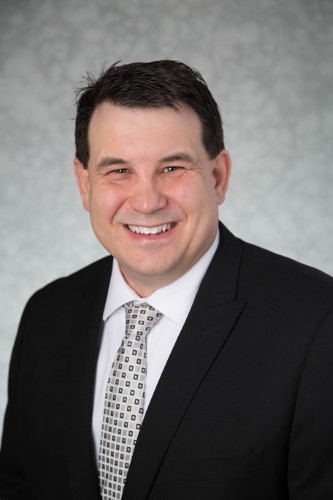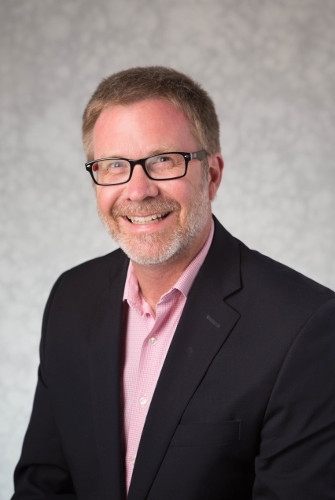Q&A Fall 2016
Study abroad: preparing for the unexpected
by Leah Twilley
Hundreds of students, faculty and staff members leave Allendale each year to see the world and experience new cultures. The opportunity allows for tremendous personal, academic and professional growth. Before their planes take off, students have gone through training and preparation about what to expect in a new place and how to handle exciting as well as unexpected experiences.
A study abroad group faced a crisis in July during a terrorist attack in Nice, France. That incident set the university’s crisis response plan in motion; Mark Schaub and Eric Klingensmith, chair and member of Grand Valley’s International Crisis Team, respectively, discussed the importance of preparation and unity with Grand Valley Magazine.
PIC offers safety tips.
Schaub: Students who are studying abroad are given safety information in written form and meet in-person with a PIC staff member. If a student goes abroad for a semester, they will usually participate in an on-site orientation. We encourage students to stay with host families because the residents know their neighborhood and what’s safe and what isn’t. Students are making a multitude of decisions every day, so we remind them to be mindful of their surroundings.
Klingensmith: If faculty members are traveling with a group, we ask that they talk with their students about safety. They should have a plan for connecting in case of an emergency and determine a place to meet.
Schaub and staff monitor risky areas.
Schaub: A student or group does not go to a place where there’s a U.S. Department of State travel warning. However, they can go through an appeal process. For example, the default policy at Grand Valley is that you cannot study in Mexico, but some students are studying in Mexican provinces where risk is low. They have to make a case and I have to be convinced by them that they will be safe.

Eric Klingensmith, Assistant Director, University Counseling Center and Coordinator of Crisis Intervention

Mark Schaub, Chief International Officer, Padnos International Center
Health risks and concerns are reviewed.
Schaub: We monitor travel alerts from the CDC (Centers for Disease Control and Prevention). We see it as an important part of our job to monitor health risks and concerns, such as SARS, H1N1 and Ebola. This year, we had special meetings about the Zika virus and its effect on our study programs in Latin America.
In 2011, a student was near a tsunami in Japan.
Schaub: There were three students in Japan at the time, but they weren’t studying near Fukushima. We immediately heard from two of the students and they were safe. But the third student, who was studying in Tokyo, went on a weekend trip to the Fukushima area. They were very close to the tsunami. We didn’t hear from her for 36 hours. We found out that she was safe and that she and her classmates had traveled on foot to a Red Cross station, where they spent a day and a half.
Students and faculty members were in Nice, France, during the terrorist attack.
Schaub: We were informed first by the faculty members that all students were alive. Then we started our process of making calls to each student’s emergency contact. In every case, each parent had already heard from their son or daughter.
Klingensmith: The intensity of emotions and mental well-being varies with everyone, so some students may have been struggling more than others. It is always important that we help them with normalization. For the group in Nice, the first step was determining their immediate needs, so we set up a Skype call to check-in with the group and then provided immediate crisis information about self-care and resources.
Study Abroad Fast Facts:
• Grand Valley ranked 11th among master’s degree-granting institutions in terms of number of study abroad participants for the 2013-2014 academic year (Institute of International Education).
• Approximately 850 students participated in programs in 2015-2016.
• Top three destinations in 2015-2016: (1) Spain, (2) Italy and (3) United Kingdom.
Learn more at gvsu.edu/studyabroad.
Whether it’s on campus or an international tragedy, unity after a crisis seems to be the theme. We unite. We pull together.
— Eric Klingensmith
A system is in place to check on the safety of students.
Schaub: If something happens, the first step is to communicate and see if the student has reached out to their emergency contact. We’ll also convene the International Crisis Team to respond to a crisis. The team includes representatives from across the university. Team members met when the group was in the attack area in Nice and we met again to debrief the situation.
If a situation warrants, we work with an outside risk management company that provides emergency and evacuation services. They can also help identify medical centers or hospitals in specific areas.
The effects of a crisis on an individual or group varies.
Klingensmith: It depends on many things, including how close you were to the incident, what you saw, and how it affects your world view. For some people, they’ve lived through worse. For others, their beliefs have been shaken up. Some people may have more emotional or physical reactions. People who have experienced previous trauma tend to have an increased level of stress. For some, common reactions may include having their sleep or appetite thrown off and they may be leery of certain situations. An everyday example of this would be if you got into a car accident, you’re probably not going to drive the same way the next day and may not sleep or have a good appetite for a few days.
Over time, the symptoms will subside for many people. For those who struggle more, we have to make sure they’re aware of services at Grand Valley’s University Counseling Center. Immediate crisis intervention is designed to help impacted individuals cope, provide support and educate people about additional resources for those who need ongoing services.
Schaub: The students in Nice were fine physically. It’s horrifying to imagine being in a crowd and experiencing a stampede, so the University Counseling Center was central to that situation to provide emotional support. We found a professional on-site in Nice for students to talk to, face-to-face.
Klingensmith: Once students returned, we made the opportunity available for any of the students who were interested to have a group crisis intervention meeting. This provided another opportunity for support and to remind them about other follow-up services that would best fit their needs and situations.
Support services are always available.
Klingensmith: We usually start with a consultation to understand how therapists at the counseling center can help and provide immediate support including information about self care. When a student returns, we offer crisis counseling or ongoing brief therapy for those who need further support.
Preparedness is important.
Klingensmith: The more people feel prepared, the more it helps with resilience. When we feel like we did everything we could, that helps down the road for a lot of people.
Whether it’s on campus or an international tragedy, unity after a crisis seems to be the theme. We unite. We pull together.
